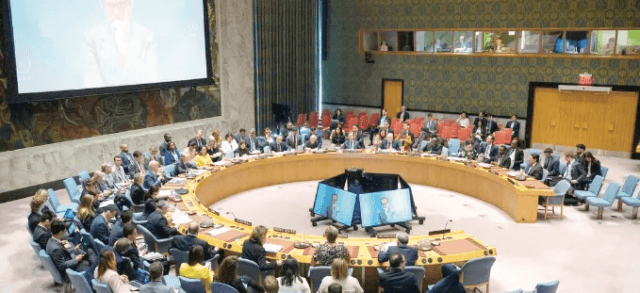New Delhi, Jun 23: An emergency session of the UN Security Council headquarters convened yesterday in New York as the world grappled with the fallout from the United States’ bombing of Iran’s nuclear sites, an action that Secretary-General António Guterres called a “perilous turn” in West Asia or the Middle East. The escalation, which saw U.S. airstrikes on key Iranian nuclear facilities, has prompted fears of a broader regional war and raised alarms over the future of the global nuclear non-proliferation regime.
Guterres, addressing the Council, urged an immediate halt to military actions and called for the protection of civilians, the safeguarding of maritime routes, and a return to diplomacy. “We risk descending into a rathole of retaliation after retaliation,” he warned. The Secretary-General emphasised the need for full access for IAEA inspectors and reaffirmed the importance of the Non-Proliferation Treaty as a pillar of international security.
Miroslav Jenča, Assistant Secretary-General for Political and Peacebuilding Affairs, described the U.S. strikes on Fordow, Natanz, and Isfahan as a “dangerous escalation.” In swift retaliation, Iran’s Islamic Revolutionary Guard Corps launched dozens of missiles into Israel, while Israel confirmed it had struck military sites across Iran, including in Tehran and Yazd. The human toll is mounting. Iran reported 430 dead and more than 3,500 injured, most of them civilians. Israel, for its part, said 25 of its citizens have been killed since the exchanges began. IAEA Director General Rafael Grossi detailed damage to Iran’s nuclear infrastructure. He confirmed visible craters at Fordow, damage to uranium conversion buildings at Isfahan, and direct hits on the Natanz enrichment site, suggesting the use of ground-penetrating and cruise missiles. While Iran has reported no increase in radiation levels, Grossi warned that such attacks could have “great consequences” and again called for restraint and dialogue.
US defends pre-emptive Strike
The US delegate defended the operation, saying it aimed to dismantle Iran’s “rapidly escalating nuclear threat” and support Israel under the principle of collective self-defence. “For decades, Iran has stonewalled diplomacy and spread terrorism,” she said, adding that Iran’s nuclear activities had reached an “unacceptable threshold.” Referring to President Donald Trump’s remarks, she warned Tehran that any retaliation, direct or indirect, would be met with “devastating” consequences. Israel’s representative called the strikes “historic,” thanking Washington for “removing the greatest existential threat facing the free world.” He framed the mission as an act of necessity and accused Iran of using diplomacy as cover while advancing its weapons programme.
Iran denounces ‘Illegal Aggression’; vows proportionate response
Iran’s envoy delivered a defiant response, calling the strikes an act of “blatant aggression” orchestrated by Israel and enabled by the U.S. “Netanyahu has hijacked American foreign policy,” he declared, vowing that Iran’s armed forces would decide the timing and nature of its “proportionate response.” Tehran rejected claims of pursuing nuclear weapons, accused Washington of hypocrisy and imperialism, and called for Security Council action under Chapter VII of the UN Charter. “If this Council fails to act,” he warned, “the stain of complicity will forever remain.” He also accused the U.S. of derailing upcoming nuclear talks by supporting Israel’s preemptive strike on June 15, just two days before scheduled diplomatic engagements. “How can we return to something we never left?” he asked.
Council Divided
The meeting laid deep divisions within the Council. Russia condemned the U.S. strikes as a “flagrant breach” of international law and accused Washington of once again flouting the UN Charter for geopolitical ends. Recalling the 2003 Iraq invasion, Russia said, “History has taught the U.S. nothing.”
China echoed the condemnation and urged support for a draft resolution to denounce attacks on Iran’s nuclear facilities. “Dialogue remains the only viable solution,” China’s representative said.
France and the United Kingdom struck a more cautious tone. Both called on Iran to de-escalate and return to negotiations but noted they did not take part in the strikes. “This is a pivotal moment for the region,” said the UK representative, while France urged Iran to halt its nuclear build-up. Other Council members voiced growing alarm. Kuwait, speaking for the Gulf Cooperation Council, warned of spillover conflict. Iraq condemned the targeting of nuclear sites as a dangerous precedent and reported repeated violations of its airspace. Sierra Leone criticised the absence of a self-defence justification and warned of undermining the Council’s credibility.
South Korea, Panama, and Denmark all emphasised that military action cannot resolve the crisis. The Republic of Korea called for a renewed diplomatic process, while Denmark urged Tehran to re-engage in negotiations. Slovenia highlighted concern over the “unclear nature” of Iran’s nuclear programme, while Greece and Somalia backed expanded IAEA access and the creation of a nuclear-free West Asia. Pakistan and Algeria defended Iran’s right to peaceful nuclear energy, condemning attacks on safeguarded sites as violations of international law. Guyana, presiding over the Council this month, called for an end to the “tit-for-tat loop of violence.”








